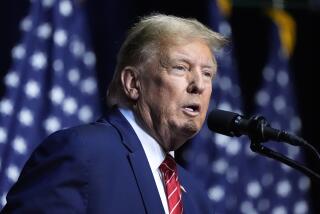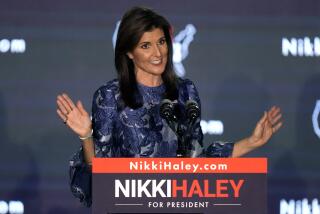Wide-open race may be Romney’s savior
Veteran political writers Don Frederick and Andrew Malcolm offer irreverent takes on the 2008 campaign.
•
- Share via
STRATHAM, N.H. — When Mitt Romney and his advisors plotted a path to the Republican presidential nomination, they figured they had superior fundraising, organization and discipline. All they needed was momentum, and that would come, they presumed, with early victories in Iowa and New Hampshire.
But after losing in the Iowa caucuses last week, falling behind John McCain in New Hampshire opinion surveys and straining to find the right message to connect with voters, the former Massachusetts governor is scrambling in the final hours before today’s primary here to salvage his early-state strategy and his presidential aspirations.
The turn of fortune has “totally stunned” some inside the Romney camp, who think they need to finish first or a close second to improve their chances of winning upcoming contests in states such as Michigan, South Carolina and Nevada, said an advisor who asked not to be named because he was not authorized to speak to reporters.
Romney plowed ahead Monday, seemingly undaunted. He made seven appearances with the same attention to promptness and detail that have become his trademarks.
He conceded that victory in New Hampshire was not certain, but he promised a protracted fight for the Republican nomination. He renewed his attacks on Sen. McCain of Arizona as a creature of Washington who could not win in November among an electorate clamoring for leaders to take the country in a new direction.
He said Sen. Barack Obama of Illinois, the Democratic front-runner, had already shown he could beat longtime Washington politicians with his victory in the Iowa caucuses.
“It’s going to take a person who is himself an innovator, like myself, who has the experience to bring change to Washington, to be able to go head to head with Barack Obama and win,” said Romney, who has been arguing more forcefully in recent days that he is the Republican best positioned to defeat any Democratic nominee in November.
Romney’s top aides said he had long cast himself as an outsider capable of shaking up Washington, although they conceded he had used the closing days of the race here to increasingly emphasize a break with the status quo. The Romney advisor who spoke anonymously said there had been an ongoing discussion about how to weight the candidate’s pitch.
“There has always been a debate in Romneyworld as to whether he should run as a ‘change’ candidate -- the business professional and turnaround artist -- or run as the consensus conservative,” the advisor said. “He wanted to do both and has tried to do both, but that is hard. The political universe can only digest so much information about a candidate at one time.”
Political consultant Eddie Mahe said the struggle to develop a single, compelling message had been damaging.
“I think their whole strategy seemed to be purely mechanical,” Mahe said. “It seems focused on, do they have enough ads, enough organizing? But they never did seem to define a candidacy clearly.”
Political observers said Romney needed to clarify his profile, lest he join a short list of Republican hopefuls -- including then-Sen. Phil Gramm of Texas in 1996 -- who had substantial campaign war chests and organizations but failed to spark the imagination of voters.
Yet some political observers said the wide-open nature of the GOP primaries meant that Romney could still recover, even if he does not win New Hampshire.
History has shown that candidates have needed to win in Iowa or New Hampshire to capture party nominations, though there are a few exceptions, such as then-Arkansas Gov. Bill Clinton in 1992. Presidential election scholar David Crockett said he thought the 2008 GOP contest was so wide open that it could be another exception to the rule.
“I don’t think [Romney] has to win there, as some say,” said Crockett, an associate professor of political science at Trinity University in San Antonio. “I think if he comes in second he is still viable. He has the money and the organization to fight on. And it’s more wide open this year.”
And Romney made it clear Monday that he intended to continue, regardless of the outcome.
“From here, we’re going to go on to Michigan and South Carolina and Nevada,” he told reporters. “This is not a one- or two-state campaign. This is a 50-state campaign.”
Romney, 60, brings both strengths and weaknesses to the argument that he can be a change agent.
He served only one term as governor of Massachusetts and never held office in Washington. He built his reputation, instead, as a leveraged buyout artist, management consultant and leader of the Salt Lake City Winter Olympics.
“He’s not deep entrenched in the old-boy network in D.C.,” Barbara Foglia, 67, a nurse, said after seeing Romney speak Monday at an Elks Lodge in Salem, her hometown. “It’s a fresh look. He has done well in business. I think he can get the job done.”
But Romney’s effort to be seen as a change agent is complicated by his close association with Bush administration orthodoxy. He supports the president on Iraq, on making the Bush tax cuts permanent and on using personal investment accounts to reform Social Security, a signature Bush proposal.
At a middle school cafeteria in Nashua on Sunday, Romney vowed also to “rein in excessive spending,” but he acknowledged in response to a question from the crowd that balancing the federal budget was not on his 12-item “to do” list, which was displayed on a banner next to the stage.
“I’ll make sure we put ‘balance the budget’ on there,” said Romney, whose aides taped the item on the banner as No. 13 by Monday afternoon. He said he would have to wait several years to submit a balanced budget, given the cost of the war.
In a two-minute television ad on the eve of the primary, Romney attempted to drive home the change theme. Without naming McCain, his target was obvious. He repeatedly blamed Washington for failing to make promised reforms, and advised voters against sending “the same people back to Washington to sit in different chairs.”
More to Read
The biggest entertainment stories
Get our big stories about Hollywood, film, television, music, arts, culture and more right in your inbox as soon as they publish.
You may occasionally receive promotional content from the Los Angeles Times.












